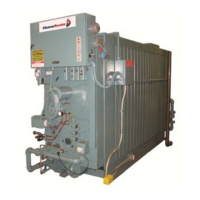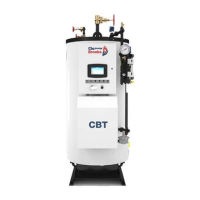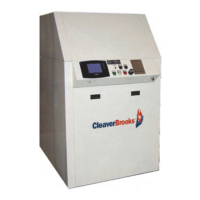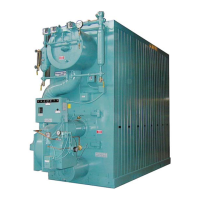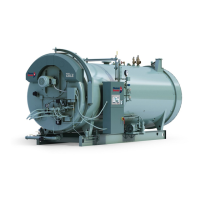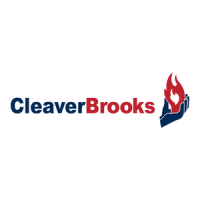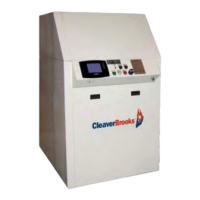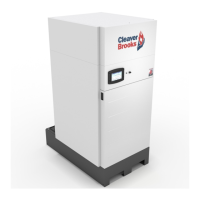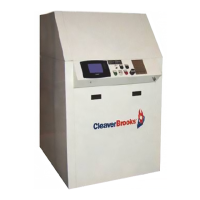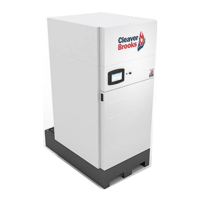Do you have a question about the CleaverBrooks 4WI and is the answer not in the manual?
General introduction to firetube boilers and their applications.
Description of the Promethean boiler's construction and components.
Details on boiler construction standards and compliance with ASME codes.
Explanation of essential pressure and safety controls for steam boilers.
Explanation of essential temperature and safety controls for hot water boilers.
Description of Induced Flue Gas Recirculation (IFGR) system components.
Details on the oil and gas burner types and their operation.
Overview of standard controls and indicator lights found on all boilers.
Explanation of the function of various control components.
Identification and function of common boiler components.
Specific controls and components related to gas fuel systems.
Controls applicable to oil-fired and combination fuel boilers.
Specific controls required for heavy oil firing systems.
Controls specific to burners designed for dual fuel operation.
Details on the supply and control of combustion air for efficient burning.
Explanation of the automatic ignition process for the burner.
Information on the primary air system for atomizing fuel oil.
Diagram and description of light oil fuel flow system.
Diagram and description of heavy oil fuel flow and circulation system.
Description of the metered gas flow through the burner system.
Explanation of how the modulating motor controls firing rate and air/fuel ratios.
Introduction to water supply and treatment importance for boiler life.
General water requirements for steam and hot water boilers.
Specific water requirements for hot water boilers, including air removal and temperature.
Ensuring continuous water circulation through the boiler for proper operation.
The Maximum Circulating Rate Chart for boiler water circulation.
Ensuring adequate and proportional flow in multiple boiler systems.
Recommendations for circulating pump placement.
Guidelines for starting and stopping circulating pumps.
Maintaining proper system pressure-to-temperature relationship for boiler surfaces.
Specific procedures for steam boiler operation and maintenance.
Procedures for operating the feed pump and ensuring correct rotation.
Importance of water treatment for boiler effectiveness and longevity.
Procedures for cleaning boiler components.
Procedures for cleaning steam and water piping to prevent damage.
Maintaining cleanliness of the pressure vessel waterside for efficient operation.
Procedure for removing manufacturing coatings from new boiler internal surfaces.
Removal of concentrated boiler water to lower dissolved solids.
Explanation of intermittent manual and continuous blowdown.
Guidelines for manual blowdown frequency based on water conditions.
Step-by-step procedure for performing manual boiler blowdown.
Requirements for periodic inspections by authorized inspectors.
Methods for preparing boilers for extended periods of non-use.
Chapter outlines electrical sequencing of burner cycles: pre-purge, ignition, run, shutdown.
Description of the burner control circuit and its components.
Detailed sequence of operation for gas or oil firing cycles.
Description of the pre-purge cycle for burner startup.
Process of pilot ignition, flame establishment, and main flame ignition.
Operation of the burner after main flame establishment.
Sequence of events during burner shutdown and post-purge cycle.
Procedure for burner shutdown and lockout due to flame failure.
Pre-startup checks and preparations for all fuel types.
Instructions for setting operating, high limit, and modulating controls.
Checking gas pilot performance and adjustment prior to firing.
Checking atomizing air supply and pressure for oil-fired burners.
Steps for establishing oil flow and pressure before firing No. 2 oil.
Steps for establishing oil flow, pressure, and temperature for No. 6 oil.
Establishing and verifying oil flow for heavy oil systems.
Adjusting oil pressure regulators for heavy oil firing.
Setting oil heater thermostats to maintain proper oil temperature.
Pre-firing checks for gas burners, including linkage and gas supply.
Initial setup and adjustment procedures for IFGR system components.
General procedures for starting, operating, and shutting down the burner.
Verification and testing of control systems during initial service and maintenance.
Introduction to burner adjustments for efficient operation and economy.
Adjusting linkage for coordinated movement of damper and metering cams.
Adjustment of internal switches on modulating motors.
Overview of operating limit, high limit, and modulating controls.
Explanation of the firing graph showing control relationships.
Adjusting modulating pressure control for steam boilers.
Setting operating limit pressure controls for steam boilers.
Setting high limit pressure controls for steam boilers.
Adjusting modulating temperature controls for hot water boilers.
Setting high limit temperature controls for hot water boilers.
Setting operating limit temperature controls for hot water boilers.
Note that low water cutoff devices require no adjustment.
Adjusting the combustion air proving switch for proper operation.
Adjusting the atomizing air proving switch for oil firing.
Adjusting gas pilot flame size for proper ignition.
Regulating gas pressure for optimal combustion efficiency.
Adjusting air/fuel ratios using a combustion analyzer for efficient combustion.
Adjusting air/fuel ratios for efficient combustion of fuel oil.
Adjusting fuel input for low-fire on 100-200 HP burners.
Adjusting fuel input for low-fire on 250-800 HP burners.
Checking burner drawer components and diffuser location.
Setting the low-oil-temperature switch for heavy oil.
Setting the optional high-oil-temperature switch.
Setting the optional low-oil-pressure switch.
Overview of troubleshooting procedures and assumptions.
Common burner problems and their potential causes.
Troubleshooting steps for ignition failures.
Troubleshooting steps when pilot flame is present but main flame is not.
Troubleshooting steps when the burner remains in low-fire position.
Troubleshooting steps for unexpected burner shutdowns during firing.
Troubleshooting steps for modulating motor operational failures.
Importance of maintenance and inspection schedules for boiler performance.
Guidelines for scheduled inspections of the pressure vessel and boiler components.
Schedule for daily, monthly, semi-annually, and annually boiler inspections.
Procedures for cleaning soot and non-combustible deposits from fireside surfaces.
Importance of checking and maintaining water level controls.
Specific instructions for maintaining steam boiler water level controls.
Procedures for inspecting, cleaning, and replacing water gauge glasses.
Monthly inspection of electrical connections and controls cleanliness.
Maintenance and testing of the microprocessor-based flame safety control.
Procedure to test for pilot flame failure and safety shutdown.
Procedure to test for failure to ignite the main flame.
Procedure to test for loss of flame during normal operation.
Inspection and maintenance procedures for oil burner components.
Guidelines for cleaning light oil strainers.
Guidelines for cleaning heavy oil strainers.
Procedure for cleaning the oil nozzle and swirler.
Procedure for cleaning air purge and back pressure orifice nozzles.
Maintenance of ignition electrodes, porcelain insulators, and cables.
Inspection and maintenance of gas burner components and refractory seal.
Routine checks and maintenance for motorized gas valves.
Maintenance of solenoid valves, including disassembly and coil replacement.
Inspection and lubrication of air control damper, linkage, and cam spring.
Procedure for removing the fan/motor cassette for inspection.
Inspecting IFGR linkages, damper movement, and impeller clearances.
Procedure for installing the fan/motor cassette and checking for proper fit.
Recommendations for safety valve inspection and testing frequency.
Procedures for adjusting and maintaining the fuel oil metering valve and packing.
Specifications for lubricating oil viscosity and level.
Importance and procedure for checking and maintaining flexible coupling alignment.
Procedures for replacing the air compressor pump, including dismantling.
Maintenance of refractory components to ensure proper operation and longevity.
Maintenance of the furnace liner, including wash coating and crack repair.
Installation procedures for throat tiles and liners.
Procedures for safely opening and closing boiler doors.
Guidelines for lubricating electric motors and their bearings.
Lubrication of pivot points and moving parts in control linkage.
Lubrication instructions for the IFGR motor.
Annual maintenance of oil heaters, including cleaning elements.
Factors affecting burner adjustments and the importance of air-fuel ratio checks.
Guidelines for ordering replacement parts, including necessary information.
Part numbers for front door insulated head assemblies by boiler diameter.
List of components for front door exterior insulation, including quantities and part numbers.
Part numbers for rear door insulated assemblies by boiler diameter.
List of components for rear door insulation, including quantities and part numbers.
Part numbers for rear door insulated access plugs by boiler diameter.
List of parts for the 60" front head assembly, including item numbers and descriptions.
List of parts for front davit assemblies by boiler diameter.
List of parts for rear door davit assemblies.
List of parts for refractory throat materials for 60" boilers.
List of parts for refractory throat materials for 67"-106" boilers.
List of parts for the 60" motor cartridge assembly.
List of parts for the 67" motor cartridge assembly.
List of parts for the 78" motor cartridge assembly.
List of parts for the 85" motor cartridge assembly.
List of parts for the 96" motor cartridge assembly.
List of parts for the 106" motor cartridge assembly.
List of parts for the front head FGR linkage for 60"-85" boilers.
List of parts for the front head FGR linkage for 96"-106" boilers.
List of parts for the 60" burner drawer with gas pilot.
List of parts for the 67" burner drawer with gas pilot.
List of parts for the 78" burner drawer with gas pilot.
List of parts for the 85" burner drawer with gas pilot.
List of parts for 96"-106" burner drawer with gas pilot.
List of parts for the 60" burner housing support.
List of parts for the 67"-106" burner housing support.
List of parts for the general control panel.
List of parts for the entrance box and fuses.
Tables detailing recommended fuse sizes for motors, transformers, and pumps.
List of parts for the main gas train assembly.
List of parts for the pilot gas train assembly.
List of parts for the front head oil/air piping (60-67").
List of parts for the front head oil/air piping (96-106").
List of parts for air compressor piping.
List of parts for the air compressor assembly.
List of parts for light oil piping (78-106").
List of parts for light oil piping (60-67").
List of parts for hot water temperature controls.
List of parts for steam pressure controls.
List of parts for water column piping (60-67").
Parts lists for water column piping with various level controls.
List of parts for water column piping (96-106").
List of parts for Level Master equipment.
List of parts for external Auxiliary Low Water Cutoff (A.L.W.C.O.).
List of parts for front door air duct gaskets.
List of parts for pressure vessel manway components.
List of parts for pressure vessel handhole components.
Additional parts for pressure vessel handhole components.
| Category | Boiler |
|---|---|
| Boiler Type | Firetube |
| Fuel Type | Natural Gas |
| Operating Pressure | Up to 300 PSIG |
| Control System | Hawk Integrated Control System |
